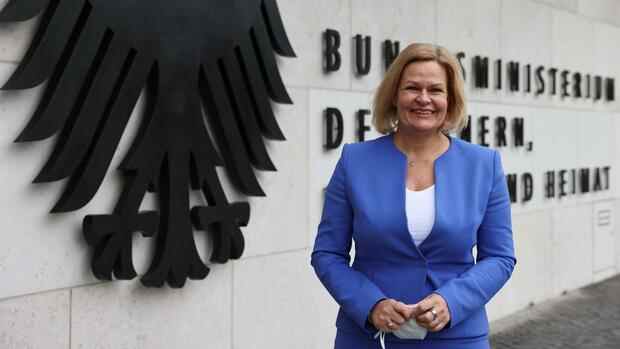Berlin The new Federal Minister of the Interior Nancy Faeser (SPD) wants to significantly accelerate the digital change in German offices. First of all, an “inventory” is necessary, “which is honest and makes transparent where we actually stand at the moment,” said the SPD politician at the “Future State and Administration Congress” held online in Berlin. Without this step, one cannot say how quickly the projects in the coalition agreement will actually be implemented. “I think we need a lot more speed there,” emphasized Faeser.
The topic of digitization is a “very, very important” concern for her and will be “very high on my agenda”. “And that is why it will also play an important role in the first 100 days,” emphasized the minister. After taking stock, she wanted to bring the issues to fruition very quickly with a “slightly different spirit of progress”.
More speed in digitization is a central project of the traffic light coalition. The word “digital” appears in 188 places in the 177-page coalition agreement. The reorganization of digital political competencies and a wide variety of digital topics will run like a red thread through the upcoming government program.
The Ministry for Digital and Transport, which is occupied by the FDP, limits itself primarily to the digital infrastructure. The entire complex of administrative digitization remains the responsibility of the Ministry of the Interior.
Top jobs of the day
Find the best jobs now and
be notified by email.
Faeser assured a user-friendly digitization. She spoke of a “digital services of general interest” in which users should think about what “helpful offers” they need for their lives as quickly as possible. Studies have shown that the population’s satisfaction with the institutions of the state and trust in society and democracy increase if the citizens actually benefit from them, explained the minister.
Serious obstacle removed
Specifically, for example, the plan is to remove a serious obstacle to the digitization of the administration, namely the written form requirement. So far, many administrative processes could only be completed if they were recorded on paper and signed with ballpoint pen or ink. This slowed down administrative procedures that were supposed to work exclusively with digital documents and electronic signatures.
The minister also mentioned the area of disaster control and the associated protection of people from the consequences of climate change. “Sometimes I am amazed that we have not yet got some things off the ground and that in some areas of work we are not yet up to date,” said Faeser, referring to the possibility of digital early warning systems.
According to Faeser, the administration should not only become more digital but also more agile over the next four years. “We will set up cross-agency, agile project teams and innovation units in order to advance the digitization of administration at all levels with great impetus,” she said. Your ministry will have to tackle “major reform projects”.
She cited the implementation of the Online Access Act (OZG) as an example. According to this, all administrative services in Germany are to be offered online by the end of next year. In practice this means: Over 6,000 services, summarized in 575 so-called OZG service bundles, have to be digitized and the administration’s own databases have to be networked with each other, from the registration to the inland shipping register. However, it is questionable whether this mammoth project will succeed in time.
Federal government pulls rip cord
She named the so-called register modernization as another major project. The Bundestag passed a corresponding law this year. The goal is not only to digitize all registers in the federal, state and local governments. By using the tax identification number as a personal identification number, the data should also be able to be clearly assigned. Citizens get access to all public services without having to collect the necessary documents every time.
Faeser also sees the IT consolidation of the federal government as a major task. The federal government has been working since 2015 to provide itself and its authorities with modern, secure and, above all, standardized IT. This includes computers and printers, but also software such as databases and mail systems.
The project did not really make progress, which is why the federal government pulled the rip cord last year and restructured the entire project. Since then, the Federal Chancellery has been monitoring the actions of the Ministry of Finance and the Ministry of the Interior, which are responsible. The Chancellery now expects to have completed the IT consolidation in 2028 at the earliest.
Faeser is aware of the great challenges. That is why it is now important to check exactly where you stand in order to get a lot off the ground in the first 100 days of traffic light government.
More: How digital nationalism slows globalization and divides the world economy
